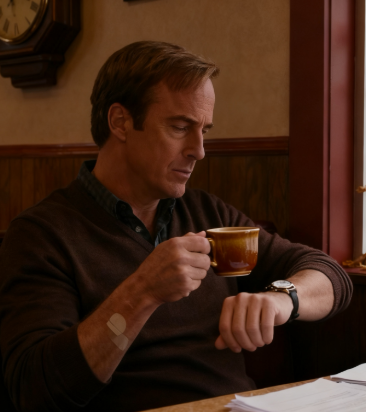
It was a small, unconscious gesture you’d seen a thousand times. A flick of the eyes, a slight turn of the wrist. For fifteen years, it had been a comforting sight. He was checking the time on the watch you’d given him for your first anniversary, its silver face and worn leather band a permanent part of him. Then, six months ago, the band had snapped during a hike. The watch was sent for repair, and the gesture remained, a ghost-limb reflex to a timepiece that was no longer there.
But lately, the gesture had changed. It was no longer a casual glance. It was a compulsion. A quick, almost frantic check of the bare skin on his left wrist. His fingers would brush the spot where the watch used to be, his brow would furrow for a split second, and then he’d carry on. You saw him do it during a movie, while grilling burgers, in the middle of a conversation with friends. It was a tiny, repeated spike of anxiety.
Your mind, that faithful architect of worry, began constructing a story. He was counting down. He was waiting for something. The watch’s absence had become a timer for a secret he was keeping. Was it another woman? A planned departure? The empty space on his wrist felt like a countdown to the end of your life together.
The truth revealed itself not in a confrontation, but in a moment of shared vulnerability. You were at a family barbecue, celebrating your father-in-law’s birthday. The old man, now deep in the throes of Parkinson’s, struggled to cut his cake, his hands trembling violently. Everyone looked away, the polite, painful silence of pity filling the room.
Everyone except your husband.
You saw him look at his father’s shaking hands, and then, his own hand flew to his bare left wrist. His fingers pressed into the skin, his knuckles white. And in that moment, you saw it—not anxiety, but terror.
That night, you finally asked. You took his left hand in yours, your thumb stroking the spot he constantly checked. “The watch isn’t there,” you said gently. “What are you looking for?”
He didn’t speak for a long time. Then, he told you about the doctor’s appointment three months ago. The one he’d hidden from you. The slight, occasional tremor in his own left hand that he’d blamed on too much coffee. The neurologist’s words: “It’s likely essential tremor, but given the strong family history… we need to monitor it.”
He compulsively checks his left wrist where the watch you gave him used to be, before he started feeling the same tremor that is slowly stealing his father, because he is waiting for the ghost in his own blood to make itself known. He isn’t counting down to leaving you. He is counting the precious, silent moments before a potential diagnosis threatens to change everything. The empty space on his wrist is a blank slate upon which he is terrified he will see his future written in the same uncontrollable script as his father’s. He wasn’t hiding a secret life; he was hiding a secret fear—the fear of becoming a burden, of losing the steady hands that had built a life with you.
You didn’t offer empty reassurance. You simply went to the drawer, retrieved the newly repaired watch, and fastened it back onto his wrist, your own hands covering his. The compulsion didn’t stop immediately. But now, when his eyes drop and his fingers twitch, they find not bare, terrifying skin, but the cool, familiar metal of the watch you gave him—a tangible reminder that no matter what time the future holds, you will face it together, second by steady second.